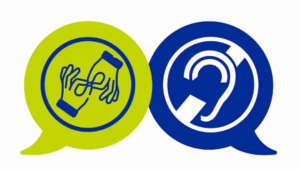Working with professional interpreters help facilitate meetings with non-English-speaking clients and also patients, smoothing interactions and creating flow. They’re an invaluable part of an ever-diversifying business world. One of the most common misconceptions in the Interpreting field is that any foreign language speaker can be an interpreter. Interpreting is a career and an industry that requires specialized knowledge of procedure. It also requires study in several fields, hours of training and preparation, and also a high level of professionalism. At Global Arena, our job is to hire and train the best in the business—but how should you work with an interpreter? What are the best practices to ensure effective communication? What are the best interpreting services for my company? To start, let’s discuss things to keep in mind when requesting an interpreter.

How to Request an Interpreter
Requesting an interpreter happens in three steps: Ask, Contact, and Follow Up. When requesting an interpreter, you should always:
-
Ask: What specific language/dialect does the non-English speaker speak?
Always ask the person with whom you’re making the appointment for the specific language or dialect that the patient speaks. While many dialects and standard language are mutually intelligible, many more are not. It’s important to have this information so that your agency can schedule an interpreter who speaks the correct language. Some of the most common examples of language confusion include Mandarin and Cantonese Chinese and Hindi, Gujarati, and Punjabi. These languages are frequently requested “by accident—” and none are mutually intelligible.
Contact your language services provider.
- If you call, send or request an e-mail to have a written record of exactly when and which language you’ve requested. To enter a request, your language services provider will need:s
Follow Up
If the assignment is less than 24 hours away and you have not received a confirmation from your language services provider, send a follow-up e-mail to request your interpreter’s name.
-
During the Session: Tips for Working Effectively with an Interpreter
Excellent! You’ve requested your interpreter and they’ve arrived at the job site. Here are some frequently asked questions and answers to guide you through best practices during your session:
-
How should I position myself during the session?
The interpreter should stand slightly behind and to the side of the non-English speaker. This ensures that the non-English speaker is the focus of the conversation.
-
To whom should I speak?
Speak to the non-English speaker, not to the interpreter. While the interpreter is the person who’s facilitating communication, their role is to be a language conduit. This is a consensual role. They’re not going to be offended if you seem to be “ignoring” them while the non-English speaker is speaking. It’s important to watch the non-English speaker as they speak in their native language. This helps the conversation flow. Remember: the goal is that the interpreter effectively “disappears,” allowing you to freely converse with the non-English speaker. Be sure to direct all questions and comments to the non-English speaker: not the interpreter.
-
How fast should I speak?
Keep your language at a moderate pace. You don’t have to speak slowly, but extra clear enunciation is always helpful. Pause frequently so that the interpreter has a chance to relate what you’re saying or asking as accurately as possible.
-
What if the interpreter interrupts?
Allow the interpreter to interject when necessary to provide cultural clarification or context for a statement. Interpreters are primarily language conduits, but they also step into the role of cultural clarifier to enhance understanding. This is the only time that the interpreter will step forward from their usual position. They will say clearly, “Excuse me, the interpreter would like to make a cultural clarification.”
-
How should I act?
Be mindful and a little extra patient during your interactions with interpreters and foreign-language speakers. It can be nerve wracking for a non-English speaker to trust that their words and point are getting across. It’s a vulnerable position. A little extra kindness goes a long way to making sure that your communication is effective and comfortable.
Working with Interpreters in a Professional Setting: a Global Arena eLearning Course
Working effectively with interpreters is a skill as important as interpreting itself. At Global Arena, we offer courses not only to interpreters but to clients as well. Our eLearning course, Working with Interpreters in a Professional Setting, is an excellent way to prepare to work with interpreters. In only half an hour, you and your staff will better understand the best industry practices. The course offers an opportunity to expand your business or brush up on basic skills for working with interpreters. It’s fully online, self-paced, and accessible from any device, any time.




